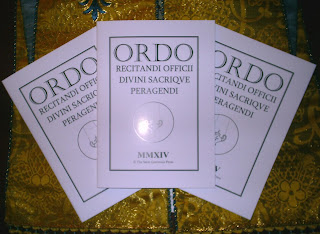
The feast of Saint Andrew the Apostle, the 'First Called', is a Double feast of the Second Class. It was preceded yesterday by a Vigil. According to St. John's Gospel St. Andrew was a disciple of St. John the Baptist, whose testimony first led him and St. John the Evangelist to follow Jesus. St. Andrew at once recognised Christ as the Messiah. St. Andrew preached the Gospel in Asia Minor and, according to Eusebius, as far as Kiev. St. Andrew is the patron saint of such diverse countries as Scotland and Russia. According to tradition he was crucified at Patras in Achaea. Devotion to St. Andrew was strong in the medieval period and many Western Kalendars such as the venerable Sarum Rite had an octave for the feast. In the Roman liturgy clearly St. Andrew was once regarded as more important than in modern times hence his inclusion in the Libera nos.
The celebration of his feast began yesterday afternoon with first Vespers. The proper antiphons Salve, crux pretiosa etc were sung with the psalms for the Common of Apostles, Pss. 109, 110, 111, 112 & 116. The Office hymn was Exsultet orbis gaudiis. The Suffrage was omitted. At Compline the Sunday psalms were sung and the preces were omitted.
At Mattins the invitatory is Regem Apostolorum Dominum, * Venite adoremus and the Office hymn is Aeterna Christi munera. In the first nocturn antiphons proper to the feast, Vidit Dominus etc., are sung with the psalms 18, 33 & 44. The lessons are from St. Paul's Epistle to the Romans. In the second nocturn the antiphons Dignum sibi Dominus etc are sung with psalms 46, 60 & 63 and the lessons are hagiographical. In the third nocturn the antiphons Non me permittas Domine etc are sung with psalms 74, 96 & 98. The homily on St. Matthew's Gospel is from the writings of St. Gregory. At Lauds the antiphons sung at Vespers, Salve, crux pretiosa etc., are sung with the Dominical psalms.
At the Horae Minores the antiphons Salve, crux pretiosa etc are sung with festal psalmody. At Prime (Pss. 53, 118i & 118ii) the first entry in the Martyrology is Dominica prima Adventus etc and the lectio brevis is Isaias enim dicit.
Mass is sung after Terce. The Gloria is sung, the Creed is sung and the preface is of the Apostles.
At second Vespers the antiphons Salve, crux pretiosa etc are sung with psalms 109, 112, 115, 125 & 138. After the collect of the feast a commemoration is sung of the first Sunday of Advent. At Compline the Dominical psalms are sung and the Dominical preces are omitted. The Pars Hiemalis of the Breviary begins with this Vespers. The Marian Antiphon after Compline is Alma Redemptoris.
In the 'vetus ordo' aka 'liturgical books of 1962' yesterday's Vigil is abolished as are first Vespers for St. Andrew's feast. Compline yesterday had the ferial psalms. At Prime and the other Horae Minores ferial antiphons and psalms are sung and the lectio brevis is of the season. Vespers are of the first Sunday of Advent with a commemoration of St. Andrew, so this year a feast of an Apostle is without Vespers entirely - very trad!








